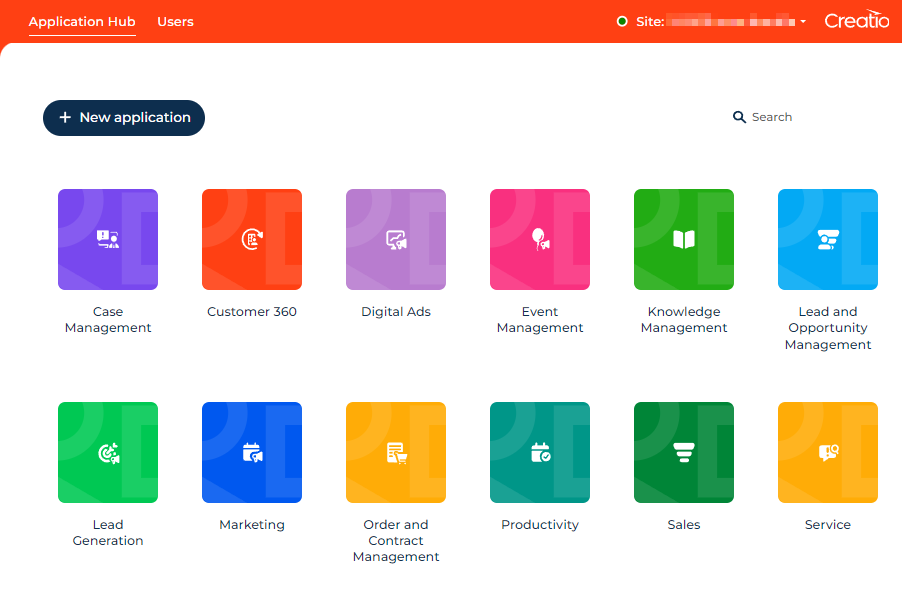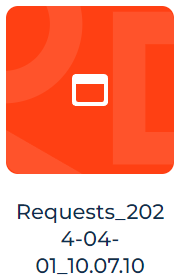Freedom UI app types
Creatio has started transfer to composable architecture and introduced a composable app level. Composable architecture lets you accelerate the app design process and maximize component reusability. Creatio platform delivers a library of composable elements that no-code creators can use to assemble function blocks, apps, and full-fledged products using no-code. The composable no-code architecture brings agility to a new level. Since all components are pluggable, replaceable, and reusable, the significant amount of configuration, customization, and development work is now replaced by assembling your apps from available blocks and components.
A Freedom UI app is the main unit of no-code development.
Compared to packages, a Freedom UI app has the following advantages:
- An app is created in a few clicks. All Freedom UI app sections are created in the Application Hub.
- An app package is created automatically.
- An app can comprise one or more packages.
- The Navigation and sections tab in the No-Code Designer displays all app sections.
- The app package dependencies are set automatically.
- If the app contains multiple schemas that replace the same page, the Pages tab in the No-Code Designer displays the last page schema that replaces all other schemas in the hierarchy.
- If the app contains multiple versions of the same process, the Business processes tab in the No-Code Designer displays the latest business process version.
- An app can include any configuration elements. For example, an app can contain both a business process or web service and one or more app sections.
- An app includes properties. Learn more: Set up the app properties.
- An app can be transferred between environments in a few clicks. Learn more: Deploy an app.
Application Hub lets you work with the following Freedom UI app types:
- Composable apps. Read more >>>
- Base products. Read more >>>
- Marketplace apps. Read more >>>
- Custom apps. Read more >>>
A Creatio instance is a Freedom UI app collection that differs based on Creatio product and version. For example, the CRM bundle version 8.1.2 contains base product apps and composable apps (Fig. 1):

Composable apps
Composable app solves business problems and contains dedicated functionality, such as a set of tools for employee request management. For example, Customer 360 is the first out-of-the-box composable app developed using the composable approach and only no-code tools. The app lets you manage contacts and accounts in Freedom UI and replaces the Contacts and Accounts Classic UI sections with their Customer 360 counterparts for new customers and new Creatio instances. During the transition to composable architecture, you can work with the Customer 360 app or Contacts and Accounts Classic UI sections in existing Creatio instances. Use this period to transfer your customizations of Contacts and Accounts Classic UI sections to the new app. To do this, follow the instructions in a separate guide: Element setup examples.
Base products
Sales, Service, and Marketing are base product apps that solve problems in a specific industry and have their own business value. Sales, Service, Marketing product functionality is implemented using composable apps. Base products are implemented in base packages. You can customize out-of-the-box functionality. The customizations extend functionality by replacing the base configuration element schemas and do not modify base packages and their configuration elements. To customize the functionality, follow the instructions in separate articles and guides:
- Overview of Freedom UI Designer and its elements
- Element setup examples
- Creatio IDE (developer documentation)
Marketplace apps
You can install the verified Marketplace app into Creatio from the Creatio Marketplace. This lets you find a solution for your industry, integrate Creatio with external services, or extend the functionality of the Creatio platform using ready-to-use Marketplace app developed by different vendors.
Similar to composable apps, you can customize out-of-the-box functionality. The customizations extend functionality by replacing the base configuration element schemas and do not modify Marketplace app packages and their configuration elements. To customize the functionality, follow the instructions in separate articles and guides:
- Overview of Freedom UI Designer and its elements
- Element setup examples
- Creatio IDE (developer documentation)
Learn more about Marketplace apps: Development for Creatio Marketplace (developer documentation).
You can publish apps on the Creatio Marketplace. Make sure your app meets the requirements: Requirements and recommendations for developing the Marketplace app, Requirements for Marketplace listing resources (developer documentation).
Custom apps
Custom apps are composable apps created manually using the Application Hub in Creatio 8.0 Atlas and later. Customers, partners, or third-party developers can create custom apps and modify custom app packages, their configuration elements, and app properties. You can customize the functionality of an exported custom app. The customizations extend functionality by replacing the base configuration element schemas and do not modify custom app packages after you export the packages to another environment. To customize the functionality, follow the instructions in separate articles and guides:
- Overview of Freedom UI Designer and its elements
- Element setup examples
- Creatio IDE (developer documentation)
Older customizations
Application Hub displays older customizations as custom apps. Older customizations are custom packages created using the Creatio IDE or Section Wizard and deployed in Creatio version 7.18.5 and earlier. Unlike composable apps, Application Hub displays the same icon and color for all older customizations (Fig. 3).

When you make the changes to self-developed older customizations from No-Code Designer, Application Hub converts older customizations into custom apps. This lets you set the app properties. Learn more: Set up the app properties.
See also
Overview of Freedom UI Designer and its elements
Development for Creatio Marketplace (developer documentation)